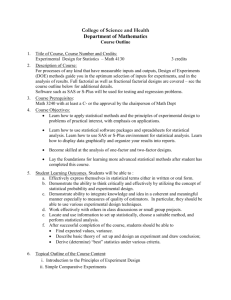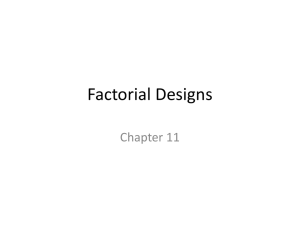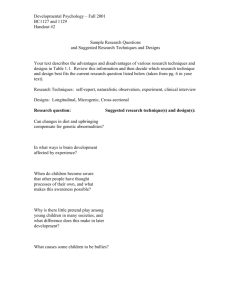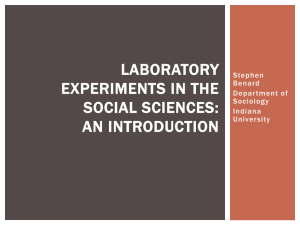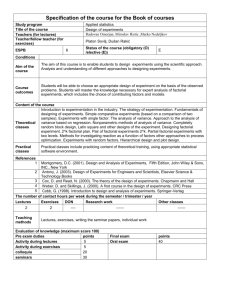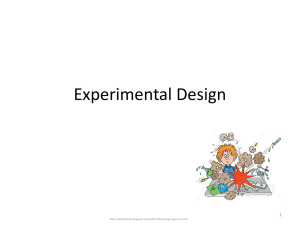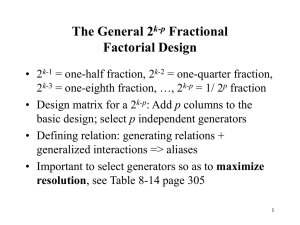Syllabus
advertisement
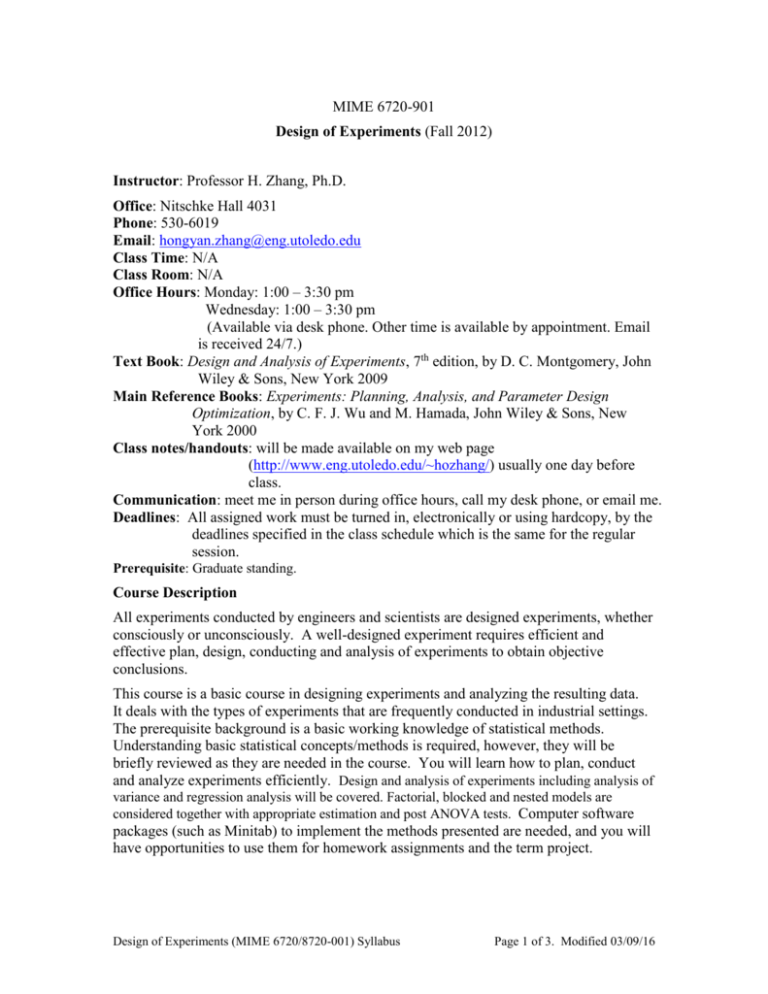
MIME 6720-901 Design of Experiments (Fall 2012) Instructor: Professor H. Zhang, Ph.D. Office: Nitschke Hall 4031 Phone: 530-6019 Email: hongyan.zhang@eng.utoledo.edu Class Time: N/A Class Room: N/A Office Hours: Monday: 1:00 – 3:30 pm Wednesday: 1:00 – 3:30 pm (Available via desk phone. Other time is available by appointment. Email is received 24/7.) Text Book: Design and Analysis of Experiments, 7th edition, by D. C. Montgomery, John Wiley & Sons, New York 2009 Main Reference Books: Experiments: Planning, Analysis, and Parameter Design Optimization, by C. F. J. Wu and M. Hamada, John Wiley & Sons, New York 2000 Class notes/handouts: will be made available on my web page (http://www.eng.utoledo.edu/~hozhang/) usually one day before class. Communication: meet me in person during office hours, call my desk phone, or email me. Deadlines: All assigned work must be turned in, electronically or using hardcopy, by the deadlines specified in the class schedule which is the same for the regular session. Prerequisite: Graduate standing. Course Description All experiments conducted by engineers and scientists are designed experiments, whether consciously or unconsciously. A well-designed experiment requires efficient and effective plan, design, conducting and analysis of experiments to obtain objective conclusions. This course is a basic course in designing experiments and analyzing the resulting data. It deals with the types of experiments that are frequently conducted in industrial settings. The prerequisite background is a basic working knowledge of statistical methods. Understanding basic statistical concepts/methods is required, however, they will be briefly reviewed as they are needed in the course. You will learn how to plan, conduct and analyze experiments efficiently. Design and analysis of experiments including analysis of variance and regression analysis will be covered. Factorial, blocked and nested models are considered together with appropriate estimation and post ANOVA tests. Computer software packages (such as Minitab) to implement the methods presented are needed, and you will have opportunities to use them for homework assignments and the term project. Design of Experiments (MIME 6720/8720-001) Syllabus Page 1 of 3. Modified 03/09/16 Project The project consists of planning, designing, conducting and analyzing an experiment, using appropriate DOE (DOX) principles. One written report and one oral presentation (if time permits) are required. The topics can be on any subjects that require the use of design of experiments principles and procedures. It is suggested that students choose topics directly related to their own research projects. This is a nice way to get extramileage from this course. However, as many experiments require significant resources to finish, it is your responsibility to make sure that your chosen project will be completed by the deadline. Depends on the size of the class, an oral presentation may be arranged at the end of the semester. Grading Policy: Homework: Project Report/Presentation: First Test: Second Test: 10% 10% 40% 40% Procedure of conducting exams and submitting completed works: 1. Homework is due two weeks after it’s assigned. Students are required to scan their completed works and submit them electronically to the instructor; 2. The exams will be conducted at the same time scheduled for the regular class, with an allowance for downloading, printing, scanning, and uploading the exam sheets. The exam sheets will be emailed to each student. The students are responsible to print the exam sheets, solve the problems, scan the completed work sheets and send them back to the instructor electronically. Other arrangements can be made if following this procedure is proven difficult-discuss with the instructor prior to the deadline. A class average grade will be determined based on the class performance, and the final grades for individuals will be determined accordingly. Date Aug. 20 Lect. # 1 Aug. 22 2 Aug. 27 3 Aug. 29 4 Course Outline and Schedule Topic Introduction to design of experiments, review of basic statistical concepts Continuing review of statistics, t-test and confidence intervals Introduction to the analysis of variance (ANOVA) More about ANOVA, multiple comparisons, residuals and model adequacy checking Design of Experiments (MIME 6720/8720-001) Syllabus Text Reference Chapter 1 & Chapter 2 (2-1 through 2-4) Homework Assignment 2-23 Chapter 3 (3-1 through 3-3) Sections 3-4 through 3-6 3-18 3-22 Page 2 of 3. Modified 03/09/16 Sept. 3 Sept. 5 5 Sept. 10 6 Sept. 12 Sept. 17 7 8 Labor Day (No Class) Choice of sample size in designed experiments, dispersion versus location effects The randomized complete block design (RCBD) RCBDs, Latin squares, etc. Introduction to factorial designs Sept. 19 9 Factorial designs continued Sept. 24 10 2k factorial designs, introduction Sept. 26 Oct. 1 Oct. 3 Oct. 8 Oct. 10 Oct. 15 11 2k factorial designs, continued Fall Break (No Class) SMWC Conference (No Class) 2k factorial designs, continued 2k factorial designs, continued Blocking and confounding in two-level factorial designs Blocking and confounding in two-level factorial designs, continued Midterm Exam (project proposal due) 2k-p fractional factorial designs, introduction 2k-p fractional factorial designs, continued 2k-p fractional factorial designs, continued 2k-p fractional factorial designs, continued 2k-p fractional factorial designs, continued Veterans’ Day (No Class) Fitting regression models Response surface methods and designsoverview Thanksgiving Eve (No Class) Random factors in experiments Random factors in factorial experiments, mixed models Nested designs 12 13 14 Oct. 17 Oct. 22 Oct. 24 Oct. 29 Oct. 31 Nov. 5 Nov. 7 Nov. 12 Nov. 14 Nov. 19 15 16 17 18 19 20 21 Nov. 21 Nov. 26 Nov. 28 22 23 Dec. 3 24 Dec. 5 Dec. 12 25 Wed. Sections 3-7 and 3-8 3-36 Chapter 4 4-9 Section 4-2 Sections 5-1 through 5-3 Sections 5-4 through 5-6 Sections 6-1 through 6-6 4-20 5-10 5-26 6-7 6-12 Sections 7-1 through 7-5 6-33 6-34 7-2 7-18 Sections 8-1 through 8-6 8-8 8-21 8-29 Sections 11-1 and 11-3 10-12 11-14 Chapter 13 13-3 Sections 14-1 through 14-3 14-2 Nested and factorial designs Final Exam (5:00 – 7:00 pm) Design of Experiments (MIME 6720/8720-001) Syllabus Page 3 of 3. Modified 03/09/16
